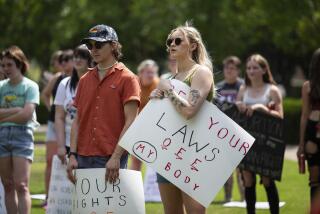Kentucky Judge OKs Rogers’ Transfer to Florida
- Share via
RICHMOND, Ky. — Alleged serial killer Glen Rogers moved one step closer to being tried for murder in Florida--where he could be executed if convicted--when a Kentucky judge ruled Tuesday that his extradition could proceed.
His attorney wants him sent instead to California, where he is accused of killing a Santa Monica woman in Van Nuys, the start of an alleged four-state murder spree.
Rogers’ attorney, public defender Ernie Lewis, raised objections to the extradition warrant signed by Gov. Paul Patton last month, including a protest that Rogers’ birth date and Social Security number were incorrect on the warrant, raising a question that he is the person it is aimed at.
Before ruling Tuesday, Circuit Judge William T. Jennings noted, “Identity might have been a crucial issue back in 1960, way before the age of speedy communication that we now have . . . way before everybody in the civilized world had access to the information superhighway.”
However, he concluded, “There is no question that Mr. Rogers is indeed the person who has been requested to be extradited to Florida.”
Commonwealth Atty. Tom Smith appeared with two lawyers from the attorney general’s office and three witnesses: a Kentucky state police detective; a Tampa, Fla., homicide detective, and a state police fingerprint expert.
The fingerprint expert testified that Rogers’ prints matched those found in the investigation of the Florida killing of Tina Marie Cribbs, whose stolen car Rogers was driving when he was caught after a high-speed chase in Kentucky last November.
Rogers, clad in a dark green prison jumpsuit and sandals, sat grimly during the hourlong proceeding, speaking only in whispers to his attorney.
In the courtroom after the hearing, Lewis told reporters that he would appeal the ruling within 30 days. The state court of appeals has no deadline to rule, but the attorney said he expects a quick decision.
He declined to say whether he would appeal to the federal courts if Rogers’ state appeals are rejected.
“I’m always optimistic,” said Lewis, when asked about the odds for blocking extradition. “I don’t want him to get the death penalty. I don’t think he deserves the death penalty. I’m fighting his going to a place that has demonstrated its excellent killing machine.”
Judge Jennings agreed with state prosecutors that Gov. Patton was free under the law to choose which state to send Rogers to for trial. California, Louisiana and Florida filed requests for extradition and Mississippi authorities also have murder charges pending.
But only Florida said its prosecutors would seek the death penalty.
“Here the death penalty played a major role,” said Lewis afterward, which Kentucky officials have denied. “If the death penalty plays a major role in his [Patton’s] making a decision, we think we had a right to be heard. We think we had a right to present mitigating proof of brain damage . . . but we weren’t given those rights.”
Late last month, Lewis filed documents relating to Rogers’ mental health.
“If there is no ground, no standard or rule, the governor should have simply gone with chronology and gone with the first state that made the request, which is California,” he said. California prosecutors have said they would not ask for the death penalty.
During the hearing, Jennings said that California officials could presumably reopen the matter if they wished. “They have the same right of redress as Mr. Rogers has had by going to court to seek to have their extradition requests acted upon,” the judge said.
“Nowhere do I find that the state of Kentucky is trying to obtain Mr. Rogers’ execution.”
More to Read
Sign up for Essential California
The most important California stories and recommendations in your inbox every morning.
You may occasionally receive promotional content from the Los Angeles Times.













